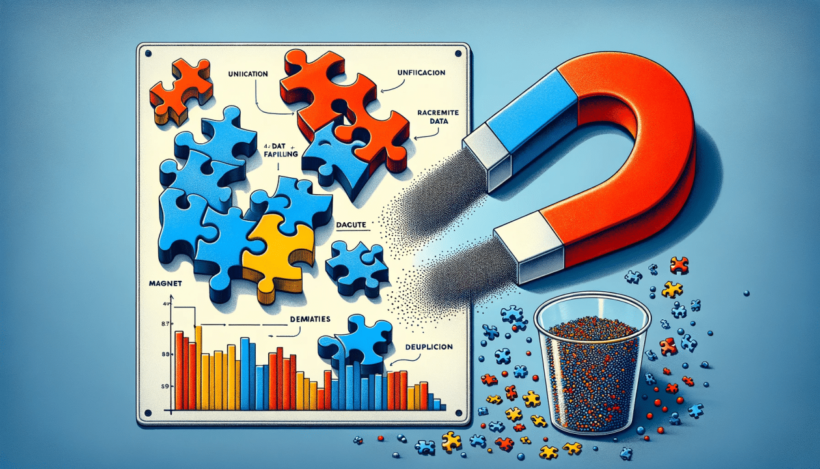How to Achieve Data Excellence for Business Success
Published by Bryce Jones on October 3, 2022
The silver lining to the pandemic is that we survived the challenge of digitally transforming our business models overnight to transition to remote-working, address the disruption in supply chains and manifest a new customer experience.
It wasn’t pretty for everyone, but the pace of change and response was incredible. KPMG discovered companies were spending an additional $15bn a week to IT during the first three months of the crisis.
For those that digitally transformed enough to weather the crisis (albeit still not through it completely yet, fingers crossed it ends soon), data now is completely fueling business operations, employee decision-making processes, and customer journeys.
And if they’re not yet, then that’s the next step. However, the challenge that all leaders should be prioritizing is how to ensure that the data are of high quality to advance in your Data Excellence journey.
Dr. Tom Redman “Data Doc” : “Data are of high quality if they are ‘fit for use,’ by customers, in operations, planning, data science, and decision-making.”
Regardless if you are trying to improve efficiency with the tools you deploy today or are planning investments in new technologies–i.e. sales efficiency tools, RPAs, predictive analytics–high-quality data will be the key determinant of their success (shout out to GIGO).
This article will help you learn how your company can achieve data excellence at every stage of your data journey.
Data Excellence for Business Success
Stage 1: Create & Collect
The initial challenge all companies face is how to manage your data creators and how to integrate all the data if they are originating from different sources. Data could be populating from web-to-leads, manual creation, inherited from other companies (post-M&A), or passed down through the years and never managed (“legacy data”).
Sales reps and marketers work every day to segment prospects, leads and customers to execute their respective tasks to grow revenue. This can become a very tedious process when data is duplicated or inaccurate. Lots of resources are wasted on a daily basis on data research and validation. Studies estimate 60% of data scientists’ time is spent on cleaning and 50% of sales time is spent on daily data quality tasks.
It’s human nature to make mistakes, and that applies to data creation and usage: whether it’s accidentally inputting the first name into the last name field, misspelling the name, or creating an account that already exists. On average, 10 – 30% of data in CRMs are duplicates, and 25% of B2B databases contain inaccurate records.
Since 75% of data loss happens due to human errors, you need a solution to prevent them from happening. We developed Delpha with the intention to augment all users to better detect these mistakes and fix them in real time. After all, data quality isn’t just an IT problem anymore, we are all data users and should take a team approach to improving data quality.
Delpha detects, alerts, and fixes inaccurate and duplicate data so that your teams can be elevated to fix these problems efficiently. You can reverse the first and last names in just a few clicks, fix the misspelled names, merge and define relationships for duplicates. Build and maintain good data with the ease of getting recommendations from your personal AI assistant.
Stage 2: Scrub & Enrich
If your company already has a mature Salesforce database, you need to look after the age and completeness of the data in it. Your data scientists or Salesforce admins are the ones who deal with its cleaning and reviewing. However, they face issues when it comes to aging data, which can decay up to 70.3% per year in B2B databases:
- On average, 30% of workers change their jobs yearly
- 43% of people’s phone numbers change annually
- Almost 20% of postal addresses change every year
Moreover, many required fields are incomplete – 8% of leads are missing information, 7% of leads contain invalid email and postal addresses. How many opportunities are you going to lose with so much missing data?
Delpha believes that it is in every employee’s power to work on scrubbing and enriching the data in your CRM, whether it being an admin or a salesperson. Thanks to AI and ML, the solution considers Salesforce interactions and user feedback to suggest the top priorities that need to be updated.
As a result, Delpha can identify the invalid or incomplete websites and SIC codes, even if your sales reps inserted gibberish in the required fields. Moreover, the solution suggests the new inputs without your employees researching it! Scrub and enrich data in a matter of seconds.
Stage 3: Analyze & Discover
Data is the new oil correct? It’s the reason why we want to collect it and extract the value from it in the form of identifying trends and insights that can inform our business decisions for better results. IDC estimates that by 2025, data creation will increase 60% to 175 zettabytes, which more than half is owned by enterprises. For these gatekeepers to actually find these insights, the data needs to be of high quality.
If your organization is acting on the insights, it is crucial to look at the consistency and usage of data. For example, if sales reps input the same data with the different labeling, this may confuse the interpretation of the results and lead to wrong product recommendations for potential customers. It can happen when a company extends its CRM to another region or two organizations merge.
Bad data distort reports and are very difficult, if not impossible, to remove after they have entered into the dashboards. The goal then is to aspire to have good data from the beginning and keep them updated so marketing and sales aren’t misled.
Delpha not only assists in enforcing your business’ processes, but is also consistently analyzing the data to detect outdated or unusual data. For example, it will flag anomalies that may pop up in certain opportunities that are results of human errors like leaving off a digit or accidentally doubling the value. We can also cross-check against multiple orgs to be able to identify duplicate or similar accounts and the user can define the relationship between the accounts–i.e. Entity matching.
Delpha can serve as your co-pilot to provide you with actionable insights on the data you are using on a daily basis to improve your productivity and effectiveness. With the help of AI, your entire team can act on your company’s most valuable insights.
Stage 4: Predict & Recommend
After insights, the next phase companies will advance is building advanced algorithms and machine learning into their business operations to enhance product features and performance, improve productivity with automation, predict customer behavior, and recommend products or services, etc.
Some organizations work with AI predictions that their CRMs propose, for example, Salesforce Einstein. You can use it to act on the recommended data to cross-sell or upsell and push the most suitable solutions to your clients.
While AI can increase productivity and sales velocity, there are still limitations from working with bad data. It’s the GIGO problem of inputting bad data into the model and getting bad results. The 80/20 problem is often referenced today where data scientists spend 80% of their time on cleaning and improving the data whereas only 20% is spent on improving the model.
Furthermore, if bad data corrupts the model, the predictions will not be relevant, and data scientists would need to spend more time on deduplicating & cleaning the poor inputs. Tom Redman says: “Poor data quality is enemy number one to the widespread, profitable use of machine learning.”
The beauty of applying an AI recommender system for each user to detect data problems is that Delpha provides personalized recommendations based on the records the users are dealing with. Instead of overwhelming the end user with all the problems within the database, it considers the user’s activity to only recommend solutions pertinent to the page and record they are working, i.e. specific accounts, contacts or opportunities.
Sales reps, marketers, service agents, and admins would see the ranking of data issues and see how it changes based on the feedback loop. It means that once you feedback that a contact is not a duplicate, it will no longer be recommended by Delpha. Your predictions can be more intelligent and actionable with the help of Delpha.
Achieving Excellence at Every Stage
Despite the stage your teams are experiencing with data right now, you can empower them to be more productive and effective with the use of Delpha. We designed Delpha to assist your team with improving data quality and productivity regardless of how your business is using data today in its business operations.
The main goal for us is to ensure companies can improve their data to be updated and complete before they get applied to the business operations.
Bad data is not only costly for the business, but also serves as an obstacle for companies to evolve how they use and apply data. If the database is filled with bad data from the beginning, then it will be very challenging to progress through the advanced stages of data usage which many are striving for to remain competitive and improve business performance.
We want to help all businesses and organizations achieve Data Excellence at every stage of their journey. It begins with eliminating bad data and preventing it from decaying, and doing it with the entire team collectively.
Want to learn more about Delpha?







